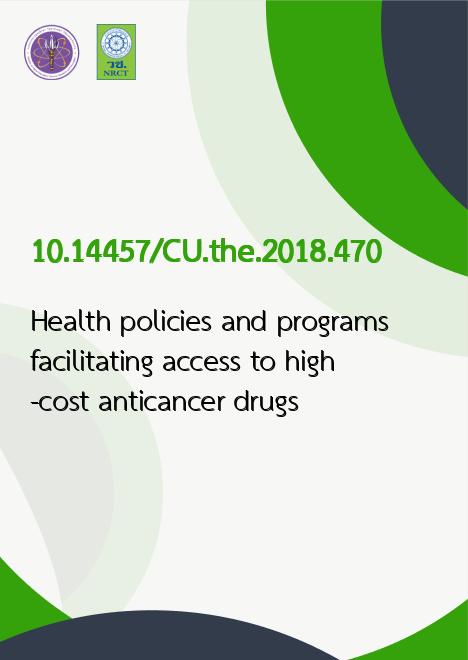
|
Health policies and programs facilitating access to high-cost anticancer drugs |
|---|---|
| รหัสดีโอไอ | |
| Title | Health policies and programs facilitating access to high-cost anticancer drugs |
| Creator | Chanthawat Patikorn |
| Contributor | Puree Anantachoti |
| Publisher | Chulalongkorn University |
| Publication Year | 2561 |
| Keyword | Medical policy, Antineoplastic agents, นโยบายสาธารณสุข, ยารักษามะเร็ง |
| Abstract | Access to anticancer drugs is limited mainly due to their high cost. To support policymakers in Thailand to develop policies and programs to facilitate better access to high-cost anticancer drugs, global and local evidence are needed. A systematic review of literature was conducted using PubMed, Embase and Web of Science between October 8-11, 2018 to identify peer-reviewed articles published in English from 2000 to 2018. Studies were included if they described health policies or programs facilitating access to high-cost anticancer drugs. Using thematic synthesis, policies and programs were summarized by themes and by income classification of countries. In addition, a qualitative in-depth interview was conducted with key informants in Thailand to study access to high-cost anticancer drugs across three health benefit schemes. The search identified 2112 studies, of which 113 studies in 178 countries were included in this review. Four themes of policies and programs were identified: Reimbursement and pricing policies, Alternative funding models for high-cost drugs, Procurement, Flexibility of patent law and Assistance programs. Access to high-cost anticancer drugs mainly depends on individual country’s pricing and reimbursement policies as the costs of these drugs are beyond patients’ affordability. Low- and middle-income countries mainly facilitate patient access through pharmaceutical industry-initiated patient assistance programs. In high-income countries utilized various strategies to overcome uncertainties and relatively poor cost-effectiveness of these drugs, for example, Managed Entry Agreements (MEAs) and dedicated fund for anticancer drugs. Interviews were conducted between July 2018 and November 2018 with 9 informants in Thailand. Six key themes emerged from the analysis synthesized by patient access to high-cost anticancer drugs under different programs and drug formularies. For example, E2 access program under National List of Essential Medicines (NLEM), Oncology Prior Authorization (OCPA), and Patient Access Programs (PAPs). Patients under the three health benefit schemes can access to high-cost anticancer drugs listed in NLEM especially E2 access program. Prescription of non-NLEM drugs requires out-of-pocket payments from patients. Civil servant medical benefit schemes patients have better access to high-cost drugs compared to the other two schemes, through the OCPA. However, OCPA has limited number of reimbursed drugs as well as strict prior authorization process. PAPs also play major role in supporting self-paying patients, but they have to be simpler in order to reduce burdens to the healthcare professionals. The use of MEAs is found to be introduced to Thailand which is the further step to deal with sustainability of PAPs, which have limited budget. MEAs are written contractual agreements between payers and pharmaceutical companies to ensure transparency and could share the risk of uncertainties among these parties |
| URL Website | cuir.car.chula.ac.th |